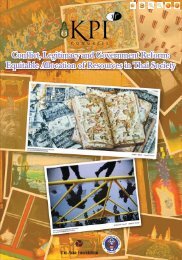SUFFiciENcy EcONOMy ANd GRASSROOtS DEvElOPMENt
SUFFiciENcy EcONOMy ANd GRASSROOtS DEvElOPMENt
SUFFiciENcy EcONOMy ANd GRASSROOtS DEvElOPMENt
Create successful ePaper yourself
Turn your PDF publications into a flip-book with our unique Google optimized e-Paper software.
The Meaning of Sufficiency Economy <br />
International Conference<br />
239<br />
need artificial air-conditioning.<br />
The seventh precept in Buddhism encourages the practitioners to avoid all kind<br />
of entertainment, such as listening to music, watching films or singing songs. Many<br />
Asoke lay people try to follow the Eight Precepts, which is a sign of a more serious<br />
practitioner, whereas Five Precepts is regarded to be the general rule for all<br />
Buddhists. <br />
The Asoke people wake up between 3 to 4 am, which further discourages<br />
people from watching TV late into the night or indulging into other night<br />
entertainment. <br />
Concluding one can summarize that the Asoke group has its high ideals of<br />
modest living and living in self-chosen poverty, but the group is also rather flexible<br />
in accommodating the modernity of present-day Thailand.<br />
From 2001 to 2010, Asoke group trained Thai farmers in organic agriculture in<br />
the Asoke centres. The farmers were elected and sent by the Bank of Agriculture and<br />
Agricultural Cooperation (BAAC), which had chosen them among the most<br />
indebted farmers. The BAAC also paid the expenses caused to the Asoke centres<br />
from these training courses.<br />
The Bank of Agriculture and Agricultural Cooperation (BAAC) chose the<br />
participants for the training courses among the most-indebted farmers. The average<br />
debt of a farmer varied between 30,000 to 60,000 Thai baht. When the average<br />
income of a farmer is between 1,500 to 3,000 baht a month, the debt becomes<br />
unbearable. 13<br />
The training courses constituted of a rigorous five-day period of asceticism,<br />
where groups of peasants arrived in the Asoke centres, had to attend the early<br />
morning session at 3.30 am, eat vegetarian food, usually only two meals a day, and<br />
follow the Five Precepts. The farmers were divided into smaller groups, they were<br />
given daily tasks to participate in the different work bases, and they listened to series<br />
of long lectures on organic agriculture, household economics, basic healthcare, and<br />
Buddhist teachings. <br />
Asoke group has created an Organic Farming Network, which the trainees can<br />
join after having switched to organic farming. The Network tries to facilitate the<br />
marketing of organic products. The Network peasants can sell their products<br />
wherever they can find a market, but belonging to the Network, guarantees them the<br />
markets that the Asoke group can offer, which is the fresh market and Palang Bun<br />
supermarket at the Santi Asoke temple in Bangkok; and markets, shops and<br />
restaurants in Ratchathani Asoke, Sisa Asoke, Pathom Asoke and in Chiang Mai;<br />
and any of the other existing Asoke vegetarian shops and supermarkets in Thailand.<br />
13<br />
Based on my survey among the participants of the training courses in April 2002 in Sisa<br />
Asoke.














